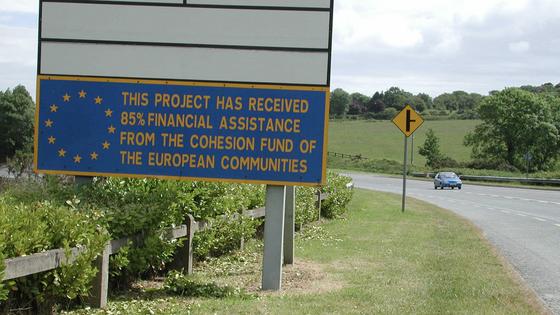Rick Steves’ Europe: European Union 103 and how the EU impacts travelers in Europe
When Jean Monnet brainstormed the modern European Union, he based his peace-driven idea on America’s model of independent states, united by a greater goal. With the help of the US, Monnet planted the seeds for a bloc that has not only established today’s European peace and prosperity – but also impacts how we experience Europe.
When European integration hit full swing, I (like many of my European friends) feared each country's independent pride and individual culture would be threatened. But just the opposite seems to be happening. The EU promotes identity among its nations by annually allocating hundreds of millions of euros for cultural heritage protection. Ireland, for example, receives EU funds that keep traditional Irish dance schools alive, help preserve the Irish language, and ensure the Cliffs of Moher receive proper maintenance. All 27 EU countries receive similar funding.
But this goes deeper than just protecting national culture. Borders can get messy, and don’t always line up perfectly with cultural identity. (Just ask the Basque people, who live on both sides of the Spanish-French border.) The EU is filled with ethnic groups that have their own heritage, and a lot of Europe’s historic troubles have come from fears of their identities being squashed. Preserving peace on a sprawling, multi-ethnic content requires respecting and celebrating diversity beyond just a national flag. It means understanding that residents of Palermo aren’t just Italian, they’re Sicilian.
Therefore, the EU works to protect ethnic heritage – sometimes even more than "national" heritage. A friend of mine is an archaeologist in Tirol, a region spanning parts of Italy and Austria. When he wants money to excavate a castle, he goes to the EU. If he says, “I want to do something for Austria,” he often comes home empty-handed. So instead, he says he wants to do something for Tirol … and gets funding.
The result of this is that the EU impacts who we meet in Europe. If you share a table with a local at Munich’s Hofbräuhaus, they might say they’re Bavarian. They also might say they’re German, or European. On Sundays in Barcelona, you’ll clasp hands and dance the Sardana with someone who identifies as Catalan – and Spanish, and European. Many city halls fly three flags, reflecting three loyalties: region, nation, and Europe. And, in the eyes of the EU, they all have an important part to play in this greater project of collaboration.
The EU also helps us travel Europe. Bolstering infrastructure was an early ideal of the bloc. I don’t remember freeways in Portugal or Greece when they first joined – now, you’ll drive EU-funded highways in both, getting to your destination hours earlier than you once would have. You’ll cross between Austria and Slovenia without a passport stamp or currency exchange … just a sign on the road and a different cheese at your next breakfast. Trains are faster and better – and soon, you’ll be able to buy and manage train tickets across the EU in one seamless digital platform.
And the EU affects how we enjoy Europe. In Italy, it works to protect a key element of regional and national pride: food. If you spot an EU logo on your prosciutto di Parma, you can rest assured that the dry-cured ham is not only from Parma, but it’s aged at least 12 months in just the right conditions. (No shortcuts allowed.) You’ll pour a glass of Chianti from a bottle with a sticker on it, confirming that every step of the wine’s production took place in Chianti. EU funding also helps protect Neapolitan pizza recipes. …The list goes on, but you get the point: Like Italians, the EU believes Italian food should be Italian.
These efforts don’t always resonate with the American worldview. We might reasonably point out that, while US troops are fighting for global peace, Europe is busy making sure Champagne only comes from Champagne. Why, then, should America continue supporting Europe?
I see it as two different approaches for defending peace. While Europe has invested in “soft power” measures like building infrastructure and protecting identity, America has sunk its funds into “hard power” – building a military industrial complex. Both have proven effective in protecting against global warfare. … So is one “right” and the other “wrong”? There are pros and cons to both, and I think we could all benefit from getting together and trading notes. Travel is the best way to do this.
And when you travel Europe, you’ll see the impact the European Union has had on the Continent. Now 75 years old, the EU is once again assessing its role in a changing world. But remembering how it started – as a peace project, dreamed up in a park in Washington, DC – is crucial to appreciating how far it’s come. And I can't wait to see where it goes next.
========
(Rick Steves (www.ricksteves.com) writes European guidebooks, hosts travel shows on public TV and radio, and organizes European tours. This column revisits some of Rick's favorite places over the past two decades. You can email Rick at rick@ricksteves.com and follow his blog on Facebook.)
©2025 Rick Steves. Distributed by Tribune Content Agency, LLC.
(c)2025 RICK STEVES DISTRIBUTED BY TRIBUNE MEDIA SERVICES, INC.














Comments